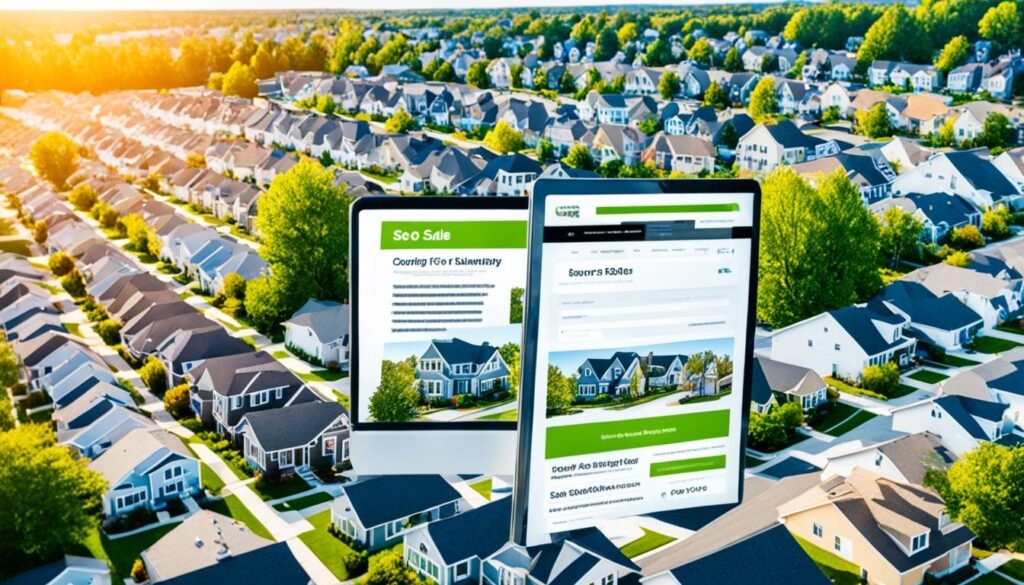
As a real estate agent, having a strong online presence is crucial to captivate buyers and stand out in search results. That's where SEO (search engine optimization) comes in. By implementing effective SEO strategies, you can improve your visibility, attract more organic traffic, and increase your chances of closing deals.
In this article, I will delve into key SEO strategies specifically tailored for real estate agents. Whether you're a seasoned agent or just starting out, these strategies will help you optimize your online presence and gain an edge in the competitive market.
Key Takeaways:
- Understand the importance of SEO in improving your online presence and attracting potential buyers.
- Conduct thorough keyword research to target specific audiences and optimize your website content.
- Ensure your real estate website is user-friendly, mobile-friendly, and fast-loading.
- Create high-quality, informative content to establish yourself as an authoritative figure in the industry.
- Build credible backlinks through content marketing and collaboration with industry professionals.
The Power of Keywords in Real Estate SEO
Keywords play a crucial role in real estate SEO as they help agents target specific audiences and improve their search engine rankings. Real estate agents should conduct thorough keyword research to identify the most relevant and high-traffic keywords within their local market.
By incorporating these keywords into their website content, property descriptions, and meta tags, agents can optimize their online presence and attract more qualified leads. Additionally, long-tail keywords—specific and detailed phrases—are valuable for targeting niche markets and improving conversion rates.
Keyword optimization should be an ongoing process, with agents regularly analyzing their keyword performance and adjusting their strategies accordingly.
Why Keyword Research Matters
Keyword research is the foundation of successful real estate SEO. By understanding the search terms and phrases that potential buyers are using, agents can create content and optimize their website to align with those keywords.
Effective keyword research involves identifying real estate keywords, local keywords, and long-tail keywords. Real estate keywords are broad terms related to the industry, such as "homes for sale" or "real estate agents." Local keywords are specific to a particular geographical area, such as "San Francisco real estate" or "Miami condos for sale." Long-tail keywords are more specific and detailed phrases that target niche markets, such as "luxury waterfront homes in Los Angeles" or "historic townhouses in Boston's Beacon Hill."
By targeting a combination of these keyword types, agents can capture a wider range of potential buyers and increase their chances of ranking higher in search engine results.
Optimizing Keywords for Better Rankings
Once real estate agents have identified their target keywords, they need to optimize their website and content to maximize their search engine rankings. Here are some key practices for keyword optimization:
"Incorporate keywords naturally into your website content, property descriptions, and meta tags."
"Ensure that keywords are relevant to the content and provide value to potential buyers."
"Avoid keyword stuffing, which can lead to penalties from search engines."
"Use long-tail keywords strategically to target specific niches and improve conversion rates."
Remember, keyword optimization is not a one-time task. Agents should regularly review their keyword performance, analyze search trends, and adjust their strategies to stay competitive in the ever-changing real estate market.
By harnessing the power of keywords, real estate agents can enhance their online visibility, attract qualified leads, and ultimately achieve greater success in their business endeavors.
Optimize Your Real Estate Website for Better SEO
As a real estate agent, optimizing your website is crucial for improving your search engine rankings and attracting potential buyers. To achieve optimal SEO results, it's essential to focus on enhancing the user experience, implementing a mobile-friendly design, ensuring fast loading speeds, and providing intuitive navigation.
A key aspect of real estate website optimization is creating a user-friendly experience. This means designing an interface that is easy to navigate and intuitive for visitors to find the information they need. A clean and organized layout with clear menus and relevant links will enhance user satisfaction and encourage longer sessions, reducing bounce rates.
Another critical factor is implementing a mobile-friendly design. With the increasing use of smartphones and tablets, it's essential to ensure your website looks and functions seamlessly across different devices. A responsive design will adapt to various screen sizes, providing an optimal user experience regardless of whether visitors are browsing on their desktop computer or mobile device.
| Benefits of a Mobile-Friendly Design | |
|---|---|
| Improved User Experience | A mobile-friendly design allows potential buyers to access your website easily, navigate through property listings, and contact you effortlessly. |
| Higher Search Engine Rankings | Search engines prioritize mobile-friendly websites in their rankings, increasing your visibility and organic traffic. |
| Expanded Reach | With a mobile-friendly design, you can reach a broader audience, including buyers who prefer to search for properties on their mobile devices. |
In addition to a user-friendly design, focusing on fast loading speeds is essential. Slow-loading websites can deter visitors and negatively impact your search engine rankings. Optimizing images, minimizing code, and utilizing caching techniques are just a few ways to improve your website's loading speed.
Lastly, optimizing your website's meta tags, headers, and image alt tags with relevant keywords will bolster its visibility in search engine results. By strategically incorporating these keywords, search engines will have a better understanding of the content on your website, which can lead to higher rankings and increased organic traffic.
Remember, a well-optimized real estate website not only improves your search engine rankings but also enhances the overall user experience, ultimately leading to more conversions and closed deals.

Key Takeaways
- Create a user-friendly experience with intuitive navigation to improve customer satisfaction and reduce bounce rates.
- Implement a mobile-friendly design for seamless browsing across different devices, expanding your reach and improving search engine rankings.
- Optimize loading speeds to prevent visitor frustration and maintain a competitive edge in search engine rankings.
- Strategically use relevant keywords in meta tags, headers, and image alt tags to enhance search engine visibility and attract organic traffic.
Leverage Content Marketing and Link Building in Real Estate SEO
Content marketing is a fundamental strategy that real estate agents can employ to enhance their SEO efforts. By creating and sharing high-quality blog posts, articles, and resources, agents can address the common questions and concerns of potential buyers, positioning themselves as authorities in the industry. Regularly publishing informative and valuable content not only attracts organic traffic to the website but also establishes credibility and builds trust with the audience.
When implementing a content marketing strategy, it is crucial to focus on producing high-quality content that resonates with the target audience. By addressing relevant topics and providing valuable insights, agents can capture the attention of potential buyers and keep them engaged. Incorporating the right keywords into the content and optimizing meta tags will improve the visibility of the content in search engine results, driving organic traffic to the website.
In addition to content marketing, link building is a pivotal component of real estate SEO. By collaborating with other industry professionals and contributing guest posts to reputable websites, agents can expand their online reach and build valuable backlinks. Backlinks from authoritative sources enhance credibility and authority, greatly improving search engine rankings. Actively seeking backlinks from relevant sources, such as local directories or industry publications, further strengthens the SEO strategy and drives more organic traffic to the website.
By leveraging the power of content marketing and link building, real estate agents can optimize their online presence and achieve higher visibility in search engine results. Creating high-quality content that addresses the needs and interests of potential buyers, combined with effective link building strategies, ensures that agents stand out in the competitive real estate market and attract qualified leads.
FAQ
What is the importance of SEO for real estate agents?
SEO helps real estate agents optimize their online presence, improve visibility in search results, and attract more potential buyers.
How can real estate agents make use of keywords in their SEO strategy?
Real estate agents should conduct keyword research to identify relevant and high-traffic keywords. These keywords should be incorporated into website content, property descriptions, and meta tags to attract qualified leads.
What role does website optimization play in real estate SEO?
Website optimization ensures a user-friendly experience, responsive design for different devices, fast loading speeds, and informative content. Optimizing meta tags, headers, and image alt tags with relevant keywords boosts search engine visibility.
How can content marketing and link building enhance real estate SEO?
Content marketing involves creating high-quality blog posts and resources that address potential buyers' questions and concerns. This establishes agents as industry authorities and attracts organic traffic. Link building helps build credibility and authority through collaborations, guest blogging, and seeking backlinks from relevant sources.
Source Links
- https://www.benzinga.com/news/24/03/37906004/trumps-treasures-on-the-line-a-march-25-deadline-approaches-heres-what-happens-next
- https://www.benzinga.com/news/24/03/37906898/ah-cluck-it-chick-fil-a-ditches-antibiotic-free-chicken-policy-citing-supply-issues
- https://www.affordablehousing.com/philadelphia-pa/246-n-ramsey-st-681580/











